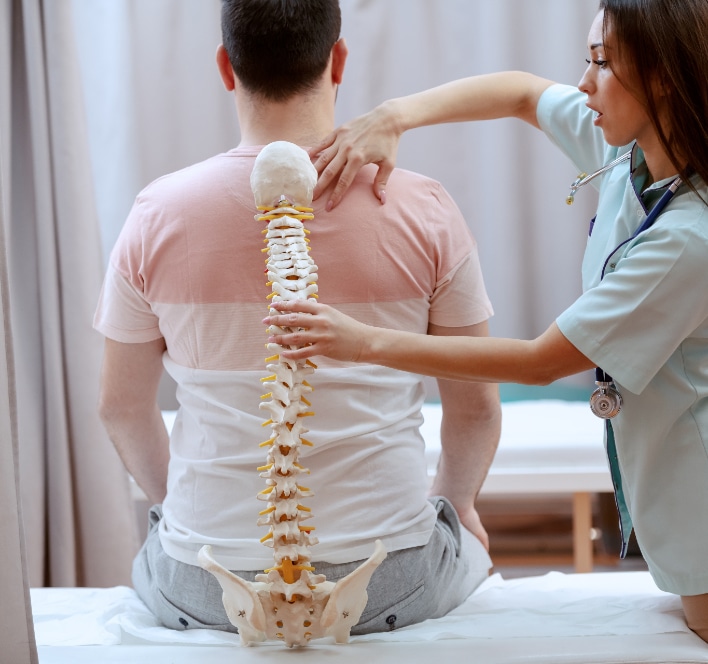Spinal discs provide structure and support to the spine. Positioned between each vertebra, the spinal discs not only act as shock absorbers for the spine but also help to hold the vertebrae together and act as cartilaginous joints, providing essential mobility. With time and age, spinal discs can undergo a series of structural and chemical changes that cause them to degenerate and cause pain. While not every person with damaged discs will experience pain, affected disc structures will place individuals at a higher risk for experiencing back pain.
If you are experiencing chronic back pain that you suspect is related to damage to your discs, it’s important to seek medical attention from a skilled spine expert. An experienced spine doctor can suggest both physical therapy exercises and effective back pain treatments for relief. Here is some important information to know about how disc degeneration causes back pain.
How do Spinal Discs Become Painful?
When spinal discs start to degenerate—either as a result of age or lifestyle factors—it can result in back pain. Discs have two main structural components: a tough outer layer and a soft inner layer. When damage occurs to either of these pieces, the disc can start to degenerate. Some of the ways that a disc can start to degenerate include:
- The elastin fiber content in the disc’s outer layer starts to increase
- The pressure needed for the disc’s inner layer to maintain high water content decreases
- The height of the disc starts to decrease
While all three of these mechanisms can contribute to disc degeneration, a decrease in water content is the most common culprit. At birth, the water content in your discs is usually around 80%. By the time a person reaches their sixties, this concentration reduces to around 65% depending on the person. Maintaining a good water concentration is essential for maintaining a disc’s spongy layer and shock-absorbing capabilities. When discs become dehydrated it will not only affect the integrity of the disc but also surrounding structures. For example, some effects of dehydrated discs include:
- Fractures in surrounding bones
- Build up of cellular waste
- Thinning of cartilaginous endplates
- Reduced blood vessel count in endplates
- Narrowing of surrounding nerve pathways, which can lead to spinal stenosis
- Radicular pain
Since a degenerating disc can have a domino effect on surrounding bones, ligaments, nerves, and tissues, it’s best to address them as soon as possible. Without early intervention, damaged discs can result in significant bouts of back pain.
What to Know About Degenerative Disc Disease Pain
When damage occurs to a disc in any of the ways described above it may or may not result in pain. However, while not every person will have symptoms, disc degeneration is strongly associated with the lower back. This pain may be a result of a variety of factors including:
- A disc’s proteins can cause inflammation and pain when they come into contact with surrounding nerves, joints, or muscles.
- Reduction in disc space. When a disc’s height and water content start to diminish, it can collapse the disc space, placing stress on surrounding joints and muscles.
- Increase in vertebrae motion. When a disc starts to degenerate, it can cause an increase in motion between the two vertebrae it supports, causing irritation in nerve roots and potentially, the formation of bone spurs.
The pain associated with degenerated discs can be mild or severe. Additionally, it can be exacerbated by certain positions, movements, and lifestyle choices. If you are struggling with disc pain, you should consult a skilled spine doctor.
Consult a Skilled Spine Doctor Today for Help With Your Disc Pain
If you have been struggling with chronic disc pain that isn’t resolving with rest, over-the-counter medications, and conservative strategies, it may be helpful to consult a spine doctor. At NJ Spine & Orthopedic, our doctors are dedicated to treating your pain and helping you get your life back.
Our experienced and board-certified neurologists, neurosurgeons, and orthopedic specialists work together to treat spine and back disorders with minimally invasive techniques. Our doctors understand that every person is unique and requires a personalized treatment plan. At NJ Spine & Orthopedic, we treat people, not patients. To schedule an appointment with one of our skilled spine experts, call (866) 272-9271 or complete our online contact form.

